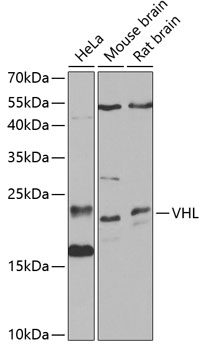Product Detail
Product NameVHL Antibody
Host SpeciesRabbit
ClonalityPolyclonal
PurificationAntibodies were purified by affinity purification using immunogen.
ApplicationsWB,IHC,IF
Species ReactivityHuman,Mouse,Rat
SpecificityThe antibody detects endogenous level of total VHL protein.
Immunogen TypeRecombinant Protein
Immunogen DescRecombinant protein of human VHL .
Target NameVHL
ConjugateUnconjugated
Other NamesVonHippel-Lindaudiseasetumorsuppressor; pVHL; ProteinG7; VHL;
Accession NoSwiss-Prot:P40337
NCBI Gene ID:7428
Uniprot
P40337
Gene ID
7428;
Sdspage MW24KD
Concentration1.0mg/ml
FormulationSupplied at 1.0mg/mL in phosphate buffered saline (without Mg2+ and Ca2+), pH 7.4, 150mM NaCl, 0.02% sodium azide and 50% glycerol.
StorageStore at -20˚C
Application Details
WB 1:500 - 1:2000
IHC 1:50 - 1:200
IF 1:50 - 1:200
Immunofluorescence analysis of U-251 MG cells using VHL Polyclonal at dilution of 1:100 (40x lens). Blue: DAPI for nuclear staining.
Western blot analysis of extracts of various cell lines, using VHL at 1:1000 dilution.
Immunohistochemistry of paraffin-embedded rat ovary using VHL at dilution of 1:200 (40x lens).
Immunohistochemistry of paraffin-embedded human tonsil using VHL at dilution of 1:200 (40x lens).
Immunohistochemistry of paraffin-embedded mouse spleen using VHL at dilution of 1:200 (40x lens).
The Von Hippel-Lindau (VHL) protein is a substrate recognition component of an E3 ubiquitin ligase complex containing elongin BC (TCEB1 and TCEB2), cullin 1 (CUL1), and RING-box protein 1 (RBX1) (1,2,3). VHL protein has been shown to exist as three distinct isoforms resulting from alternatively spliced transcript variants (4). Loss of VHL protein function results in a dominantly inherited familial cancer syndrome that manifests as angiomas of the retina, hemangioblastomas of the central nervous system, renal clear-cell carcinomas and pheochromocytomas (4). Under normoxic conditions, VHL directs the ubiquitylation and subsequent proteosomal degradation of the hypoxia inducible factor HIF alpha, maintaining very low levels of HIF alpha in the cell. Cellular exposure to hypoxic conditions, or loss of VHL protein function, results in increased HIF alpha protein levels and increased expression of HIF-induced gene products, many of which are angiogenesis factors such as vascular endothelial growth factor (VEGF). Thus, loss of VHL protein function is believed to contribute to the formation of highly vascular neoplasias (4). In addition to HIF alpha, VHL is known to regulate the ubiquitylation of several other proteins, including tat-binding protein 1 (TBP-1), the atypical protein kinase C lambda (aPKC), and two subunits of the multiprotein RNA Polymerase II complex (RPB1 and RPB7) (5,6,7,8). Interactions with elongin BC, RPB1, RPB7 and the pVHL-associated KRAB-A domain containing protein (VHLaK) suggest that VHL may also play a more direct role in transcriptional repression.
If you have published an article using product 32075, please notify us so that we can cite your literature.
et al,c-Rel is a Novel Oncogene in Lung Squamous Cell Carcinoma Regulating Cell Proliferation and Migration. In J Cancer on 2024 Mar 4
by Renru Luo, Qiongyu Liu,et al..PMID:38495491
, (2024),
PMID:
38495491







 Yes
Yes



